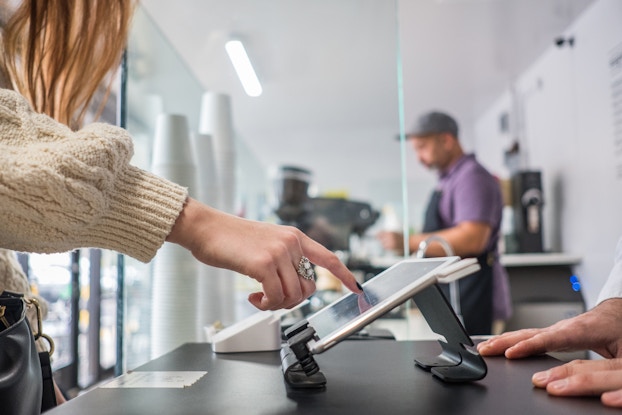
Cloud-based POS systems let small business owners accept payments and manage inventory from a mobile device or tablet. As customers demand convenience, restaurant and retail stores can reduce waiting times by equipping staff with mobile POS solutions. Indeed, Quince Market Insights expects the global mobile POS market size to grow at a compound annual growth rate of 16.39% between 2023 and 2032.
However, upfront costs and features differ among providers. The best mobile POS systems vary based on industry, budget, and more. Use this guide to learn how a POS app works and build a checklist of your must-have tools for comparing small business software.
How mobile POS systems work
Traditional point-of-sale systems sit on the counter. They resemble a small computer and may connect to the internet or your phone. Many have a receipt printer, cash drawer, and credit card reader. In contrast, a mobile POS system is portable. You install a point-of-sale application on your cell phone or tablet to take orders or process payments from anywhere using an internet connection, whether Wi-Fi or your phone's data. Or leverage an iPad POS system to alternate between stationary and mobile use.


Like conventional POS software, a cloud-based POS system can connect to receipt printers and cash drawers. You can enter credit card processing details into a virtual terminal or attach a card reader to your mobile device. Alternatively, it's possible to provide guests with a quick response (QR) code for contactless payments, ideal for curbside pickups or quick-service restaurants.
Some mobile POS solutions include built-in payment processing, whereas others let you choose your own payment processor. A standard POS system may extend its functionality by providing mobile POS options, allowing you to accept payments at cash registers, tables, food trucks, and farmer's markets.
[Read more: 7 Technology Tools to Help You Run Your Business From Anywhere]
Choosing the best POS system for small business owners
Mobile POS systems let retail stores sell wares at festivals or enable curbside purchases via a payment link or QR code. In the restaurant industry, street vendors and food trucks can sell from anywhere, or waitstaff can accept payments at the table. And small businesses with multiple locations appreciate the flexibility to use their POS software almost anywhere.
Many mobile systems support online ordering. For instance, you can sell in-person, online, or at your client's home with Square POS. It even integrates with Instagram and Facebook. Best of all, Square offers free POS software. Similar to Lightspeed Restaurant POS, Square provides menu management tools and inventory tracking features.
Startups and small businesses often select mobile POS systems to avoid hardware costs. Simply install the POS app on your Android or iOS device and send receipts via email or text.
Mobile POS pricing and fees
Startups and small businesses often select mobile POS systems to avoid hardware costs. Simply install the POS app on your Android or iOS device and send receipts via email or text. You won't pay monthly fees if you choose a provider offering a free version. But, even with a free plan, you will pay credit card processing fees on transactions.
According to Forbes Advisor, the best mobile POS systems charge a monthly fee ranging from free to almost $200. Paid versions may have advanced inventory management tools or restaurant-specific features. Again, credit card processing fees apply to all debit or credit card purchases.
Although a mobile POS option has fewer upfront costs, certain equipment can drive up your expenses, such as:
- Kitchen display system.
- Cash drawer.
- Receipt printer.
- Standalone barcode scanner.
- Mobile credit card reader or separate terminal.
In addition, unless you're a solopreneur, you'll want to factor in the costs of your smartphones or tablets and device insurance. In most cases, employees should use company-provided hardware. Since few cell phones are naturally durable, consider purchasing protective yet functional cases and mobile insurance.
[Read more: A Guide to Understanding Credit Card Processing]
Mobile POS software features
Many mobile POS systems offer robust features, even on a free plan. However, not all tools function similarly across POS software. Adding a discount or processing a refund may take a couple of clicks in one app, whereas another involves multiple steps. Always write down the tasks your mobile POS system must handle and complete a test run using free POS software or a demo account.
The best POS systems for small businesses include the following features:
- Advanced reporting and dashboards, including gross sales reports by channel or employee, operations summaries, and voids and adjustments.
- Third-party integrations with inventory tracking, accounting, employee management, and marketing tools.
- Built-in payment processing or integrations with third-party payment processor services, like National Processing or Helcim.
- Support for other types of mobile payments or digital wallets, such as Apple Pay, PayPal, or Venmo.
- A user-friendly mobile POS app with a built-in barcode scanner (if required) and the ability to accept electronic signatures.
- Contactless payments and e-commerce capabilities for online ordering, curbside pickups, and deliveries.
- Industry-specific features like menu or table management for restaurants and advanced inventory management tools for retail stores.
- A built-in customer loyalty program or the ability to capture email addresses or cell phone numbers.
- Offline mode for processing certain payment types and using POS hardware when your internet connection is down.
CO— aims to bring you inspiration from leading respected experts. However, before making any business decision, you should consult a professional who can advise you based on your individual situation.
CO—is committed to helping you start, run and grow your small business. Learn more about the benefits of small business membership in the U.S. Chamber of Commerce, here.







